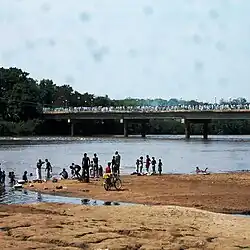Timeline of Gambela (city)
This is chronology of Gambela city, the capital of Gambela Region of Ethiopia.
- 15 May 1902 – Emperor Menelik II granted Britain use of port along with Baro River.[1][2]
- 1911–1917 – Over 70% of external trade of Ethiopia came through Djibouti, though trade rate was the fastest in Gambela until Italian conquest.[3]
- 1907 – the port and custom station were founded at Gambela.[4]
- 9 July 1927 – Regent Ras Tafari later Emperor Haile Selassie granted concessions to T Zervos and A. Danalis to construct a road 180 kilometers in length to connect Gambela with the town of Metu and Gore.[5]
- Mid-1930 – According to Richard Pankhurst, boats sailed twice in month during the rainy season, taking seven days downstream and eleven upstream.[6]
- 14 October 1936 – the shipping service suspended and the steamer, together with the British resident, left Gambela.
- 3 February 1941 – the Italian by the 2/6 King's African Rifles took Gambela.[7]
- May 1941 – Lij Tewedros, son of Lij Iyasu, surfaced in Gambela area and proclaimed himself Emperor. His insurrection was prevented by Belgian Congo troops before they left the area in February 1942.[8]
- 19 December 1944 – Anglo-Ethiopian Agreement left Gambela enclave region.[2]
- 15 October 1956 – after several years held as enclave by Sudanese government when they achieved independence, Gambela handed over to Ethiopia.[9]
- 27 May 1991 – Gambela was captured by the Ethiopian People's Revolutionary Democratic Front (EPRDF).[9]
- 13 December 2003 – Gambela massacre took place in which 30 Ethiopian highlander civilians killed Anuak population.[10][11][12]
- 12 March 2012 – 2012 Gambella bus attack killed 19 people on board being shot dead.[13][14]

Baro River in Gambela
References
- Westera, Rick. "Historical Atlas of Sub-Saharan Africa (31 May 1902): Treaty of Vereeniging". Omniatlas. Retrieved 2022-09-02.
- "1988 The Gambella Enclave - Anglo-Ethiopian Society". 2 September 2022.
- "The long-term impact of the Italian colonial expenditures in the Horn" (PDF). 2 September 2022.
- "Off the Beaten Tracks". Mimosa Ethiopia Tours. Retrieved 2022-09-02.
- Pankhurst, Economic History, pp. 290f
- Richard Pankhurst, An Economic History of Ethiopia (Addis Ababa: Haile Selassie University Press, 1968), p. 304
- "HyperWar: The Mediterranean & Middle East, Vol.II (Chapter 16)". www.ibiblio.org. Retrieved 2022-09-02.
- "Local history of Ethiopia : Gama - Garumuda" (PDF). 2 September 2022.
- "Ethiopia's EPDRF and the massacre of Anyuaks in December 2003". Sudan Tribune. 2 September 2022.
- "Ethiopia: Targeting the Anuak: The December 2003 Massacre". www.hrw.org. Retrieved 2022-09-02.
- "Ethiopia: Remembering the December 13th Massacre". www.culturalsurvival.org. Retrieved 2022-09-02.
- "Ethiopia and Sudan: "From today forward there will be no Anuak" - The attempted elimination of the Anuak people - Ethiopia | ReliefWeb". reliefweb.int. Retrieved 2022-09-02.
- "Many killed in Ethiopia bus attack". www.aljazeera.com. Retrieved 2022-09-02.
- "Gunmen kill 19 on Ethiopian bus in Gambella region". BBC News. 2012-03-13. Retrieved 2022-09-02.
This article is issued from Wikipedia. The text is licensed under Creative Commons - Attribution - Sharealike. Additional terms may apply for the media files.